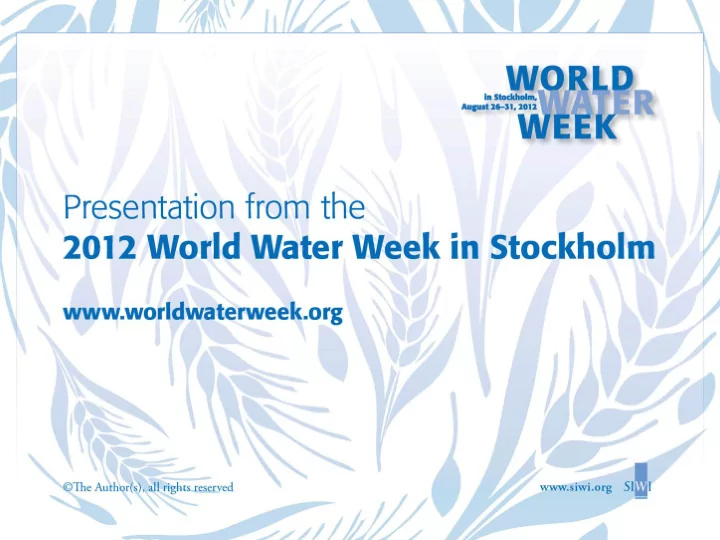

High Level Panel on the Water, Food and Energy Nexus Main Outcomes Alain Vidal CGIAR Challenge Program on Water and Food Panel Co-convener
Speakers and panelists Panel members: Gérard Wolf, Senior Executive Vice President, International Development, EDF, France Alain Vidal, Director, CGIAR Challenge Program on Water and Food Rodney Cooke, Director, Policy and Technical Advisory Division, IFAD Diego Bravo, Director, Acueducto de Bogota, Colombia Jane Madgwick, CEO, Wetlands International D. N. Kulkarni, Director, Jain Irrigation Systems, India Yaşar Yakiş, Former Minister of Foreign Affairs, Turkey Rhoda Tumusiine, Commissioner, Rural Energy and Agriculture, African Union Thomas Chiramba, Head Freshwater Branch, UNEP Speakers Uschi Eid, Vice Chair, UN Secretary General ’ s Advisory Board on Water and Sanitation and Co- Chair of the Bonn2011 Conference on Water, Energy and Food Security Nexus Lee Yangho, Deputy Minister for Planning & Coordination, Ministry of Food, Agriculture, Forestry and Fisheries, Republic of Korea Guy Fradin, Vice President, International Forum Committee, 6 th World Water Forum Facilitators Jeremy Bird, Bonn2011 ‘ Outcome Ambassador ’ Anna Dupont, 6 th World Water Forum Secretariat
Ideas & Solutions Development and food security first Addressing insecurity of food, energy and water, particularly in developing countries, should be at the forefront of development strategies. There are opportunities to grow energy generating crops as a cash crop, but not at the expense of food security trade offs. Better shared benefits Adaptive water governance systems are needed to ensure effective benefit sharing based on a clear and explicit understanding of socio- economic trade-offs at basin and sub-basin scales Flexibility is also needed to adapt to changing conditions over time Mechanisms for benefit sharing and protecting key ecosystems exist but require wider replication
Ideas & Solutions Institutional changes and integration There is a need for a balance of technical, institutional and governance improvements; one without the other will delay progress in meeting development goals and perpetuate business as usual practices Regional dialogue can lead to improved understanding and broadening the solution space With urban specificities Ending waste, resource reuse and recovery will be essential for future demands to be met, particularly in rapidly urbanizing areas where a more interlinked approach is possible under the guidance of metropolitan leaders. Beyond WWF6 General support to take the Nexus message of inter-linkage and policy coherence to Rio + 20. with a view to influencing formulation of future development goals
Take away messages & unexpected results Addressing the Nexus essential if the future needs of the global population are to be met, particularly the poor who do not have currently have access to basic services The Bonn2011 messages provide a pragmatic framework for taking the Nexus discussions forward with government, private sector, civil society and other actors Nexus considerations need political commitment for interlinked thinking across thematic areas (water, food, energy and environment) and across geographic scales, and to avoid working in “ parallel worlds ” Provision of water, food and energy are all services provided by ecosystems at the heart of the Nexus. Emerging models exist for protecting ecosystems and the services they provide Need to raise awareness of nexus issues and solutions at all levels including mobilizing public opinion to influence change. Building solutions around the end-user will deliver more sustainable outcomes
Commitments Sustainable hydropower benefits the Water, Food and Energy nexus Joint commitment from EDF Group, CGIAR, Wetlands International, IHA A working group led by CGIAR and EDF, committed to promote the nexus approach in river basins development strategies, focusing on sustainable hydropower and development Developing global dialogues about sustainable hydropower Balanced development that increases the productivity of water, food and energy Contribution and support of ecosystems services Work plan Kick off meeting during the Stockholm World Water Week 2012 International workshop by the end of 2013 Guidelines issued at the 7 th World Water Forum in 2015
MERCI / THANK YOU worldwaterforum 6 .org solutionsforwater.org
Recommend
More recommend